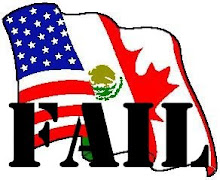My last post talked about the heartbreaking story of Ava Stinson, a baby born 14 weeks premature. Because there was no room at any of Ontario’s prenatal care centers, she was flown to Buffalo, NY, for treatment. Her parents weren’t allowed accross the border to see her because they didn’t have passports. Well great news: CBP has given them permission to cross the border and be with their daughter! Kudos to the authorities for doing the right thing in this situation.
So let’s switch gears to the many articles, commentaries, and blog posts by American authors that have tapped this story as proof that socialized medicine is a failure.
Consider this article by Jim Hoft (check out this re-posting also, as the comments are much more colourful). He talks about the number of cases where Canadians went to the US for similar premature birth needs, and how countries with socialized medicine have wonky infant mortality rates because of whether a premature child is included in the stats or not. Two things really made me laugh in his piece though.
In fact, there were at least 40 mothers or their babies who were airlifted from British Columbia to the United States in 2007 because Canadian hospitals didn’t have room for the preemies in their neonatal units.
So first Jim, some lessons on Canada. Canada’s population is approximately 33.2 million. British Columbia makes up 4.4 million of that. If *only* 40 mothers or babies had to be sent to the US for treatment, that’s pretty damn good. Also, realize that in many cases US cities are closer than the next major Canadian city (keep reading, there’s a map to help illustrate this when it comes up again). Sorry Jim, but throwing small numbers to try and prove your point just doesn’t work.
On to the other part of his article:
As we've seen with these socialized systems, some people will inevitably be denied the care they need to survive. No doubt, with Obamacare Americans will be forced to accept an inferior product with fewer choices.
Wow…”some people will inevitably be denied the care they need to survive.” Are we talking about Canada here, or the millions without adequate health care coverage that live in the USA currently? And accepting inferior care with fewer choices…maybe I’m wrong, but don’t HMO’s tell you which hospitals you can/can’t go to?
Jim isn’t the only one though. Over at Carol’s Closet, Carol was commenting from south Florida on the whole episode. She initially posted this entry, followed by this one. Let’s see what she had to say…
The country who’s health care is soooo much better than ours.
There wasn’t a single available neo-natal bed in the entire province so little Ava was transported to Buffalo, NY. Lets here it for National Health Care aka rationed health care.
First off, I don’t know who keeps telling American’s that our health care is better than the care the receive. I have no doubt that the doctors and hospital staff in the US are of a high calibre, and I don’t necessarily think that our health care system is *better* than in the US. But what our system does provide is health care for everyone. That’s the key difference: we see health care as something every citizen should have access to, a basic right of residing in this country.
Carol tries to jab our system…but I don’t think she gets it. Yes its an issue that there wasn’t a hospital bed available in Ontario. But with *our* system, the authorities were able to consider an out of system, potentially more expensive option in the US for this baby’s care. Our system took care of her, regardless of the fact that it had to happen outside our borders.
Carol references an article by Ed Morissey who asks similar types of questions.
But why wasn’t there a NICU bed for the child in the entire nation of Canada? The government of Canada won’t pay for more. They don’t exist to expand supply to meet demand; their single-payer system exists to ration care as a cost-saving mechanism.
Again, a geography lesson is required here. I highly doubt that there wasn’t a bed available anywhere in Canada. What I do suspect is that it made more sense to send the baby to Buffalo as the next closest hospital. Consider this map:
The “A” is Hamilton, and the red line shows where Buffalo is…a very short distance. We know that there isn’t a bed available in Ontario, so the three red circles represent the next closest Canadian cities. Now, what makes more sense for the health and well being of the child? The closer hospital does!
In closing, my goal of this post isn’t to try and convince anyone about Canada’s health care system being better than the US model. Our system is not perfect, and for all the good of our system we also have some bad. No, my goal here is education. There are so many misconceptions about our health care system and how it operates, and from comments on the referenced blog posts it seems political ideology trumps common sense.
Also, check out my post on Clarifying Public Healthcare for some stats and info Canada’s health care system.





